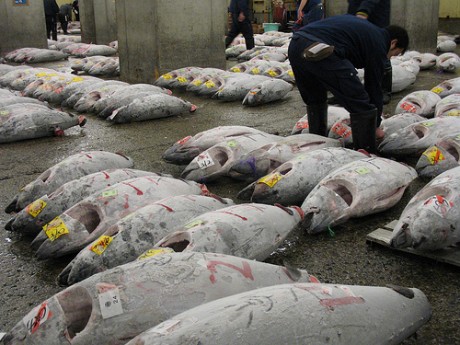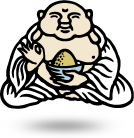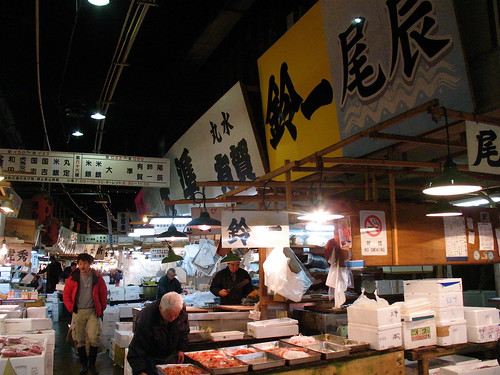Is Sustainable Seafood a Myth?
Posted by Jer Thorp on Friday, July 10th, 2009Tags for this Article: environment, ethics, fish, Seafood

Last spring, while in Tokyo, I made an early-morning trip to the famous Tsukiji fish market. It was meant to be a pilgrimage of sorts but ended up being an unsettling experience. I’ve thought a lot over the last year or so about the trip and the questions which that morning raised.
There is no doubt that Tsukiji is spectacular. The crack-of-dawn tuna auction was fascinating both in its chaos and its ritual. In the main market, stalls stretched into the distance, with box after box and crate after crate of edible sea creatures. Bright yellow motorized dollies paid little heed to the crowds of camera-carrying tourists as they carried shipments to the loading bay and ultimately to the city beyond. The market is hugely impressive due to it’s scale; but while I expected it to be an inspiring visit for a food-obsessed tourist like me, it was this scale that ended up being disturbing. Can consumption at this kind of scale be sustainable? More than that, with the human population at the size that it is, is there such a thing as sustainable seafood?
In Vancouver, many upscale restaurants have come onboard in the last few years with Ocean Wise, a program designed to inform consumers about wise choices regarding seafood consumption. The strategy of the program is to rate available seafood catches according to their environmental impact – guiding eaters towards ‘safe’ species and away from ‘unsafe’ catches plagued by overfishing, habitat damage, or bycatch.
Ocean Wise recommends a species on four different criteria:
- Abundant and resilient to fishing pressures
- Well managed with a comprehensive management plan based on current research
- Harvested in a method that ensures limited bycatch on non-target and endangered species
- Harvested in ways that limit damage to marine or aquatic habitats and negative interactions with other species.
It’s a well-intentioned idea, and seems on the outside to be a step in the right direction. But is it a big enough step? Is there such a thing as a big enough step?
At the same time consumers are moving slowly towards ‘sustainable’ choices, more and more data is being released suggesting that things might be worse than they seem. A 2006 study released in the journal Science projected that all of the world’s commercial seafood stocks will have collapsed by 2048, if current fishing trends continue. This seems to be direct conflict with the criteria set out by Ocean Wise. How can any species be ‘resiliant to fishing pressures’ if all of the world’s seafood stocks are heading for a crash?
One of the most common Oceanwise seafood choices found on local menus is Pacific Halibut. The Pacific Halibut is a ground-fish, found throughout the northern Pacific Ocean, which has been fished commercially for more than a hundred years. The halibut catch is very carefully managed by Canadian and US fisheries departments, yet the population still seems to be in decline [1]. I couldn’t find any figures indicating that the population was either remaining stable, or increasing. Isn’t that what sustainable means?
The star of BC’s seafood menus, the wild Pacific salmon, has a managed fishery, but population estimates and predictions seem to fluctuate wildly from year-to-year. As with the halibut, indicators seem to show that the population of our local salmon species may be headed for collapse [2]. Indeed, as of 2006, 13.5% of BC & Yukon Salmon populations were extinct or at high risk of extinction [3]. Again, in my admittedly limited searching, I couldn’t find any data that showed a positive or even neutral rate of population change in Pacific Salmon. Most of us who have lived in BC have anecdotal evidence of this decline – any sport fisherman will tell you that salmon fishing ain’t what it used to be.
Of course, the decline in the population of salmon, halibut, and other food species can’t be only attributed to overfishing. Watershed destruction, sea lice, changing climate conditions – a lot of things are adding up to extremely tough times for fish stocks around the world. What seems difficult for me to imagine is how fishery of any scale for these and other species whose populations are in any measure of decline could be considered ‘sustainable’. I know this is a difficult question; one that has been discussed elsewhere [4], and one which could take up an entire blog of it’s own. But it has been a question that I’ve been asking myself again and again over the last year.
Before this post descends too much farther into environmental diatribe, let me say the reason why this all disturbs me so much: I love to eat fish. Before my Tsukiji trip, I ate fish & seafood as much as I could. Not only did I believe my choices to be environmentally responsible (I always ate Ocean Wise), it also seemed like the healthiest choice. I’d read article after article about the health benefits of fish. Omega 3! I cooked fish at home, ordered it in restaurants – I probably ate once or twice a week for the greater part of a decade. I salivate at the thought of a good ceviche, and nothing spells summer to me more than a cedar-planked salmon.
So, what to do?
As much as my taste buds regret it, I eat less fish. Far less. And, though I’ll admit to eating salmon & tuna once or twice a year, I’ve tried to cut my fish intake from the top of the food chain down. I’ve started to look for more abundant seafood species like squid[5], mackerel, and herring[6] and at the same time have made an effort to memorize the species to avoid at all cost (like shrimp[7] and, tragically, as I learned writing this article, unagi’s freshwater eel).
I’ve come to look at my trip to Tsukiji market as a wake-up call. I’d love to be able to enjoy an occasional fish meal in 2048 (I’ll be 73) but in order for that to happen, we’re all going to have to make some changes.
—–
[1] In May, the NOAA’s Alaska Regional office announced a reduction in charter Halibut catch stating that “”Sport charter fishing has grown in southeast Alaska while halibut abundance has decreased.” http://alaskafisheries.noaa.gov/newsreleases/2009/charterhalibut050609.htm
[2] “Changing Ocean Currents Impacting Salmon” June 21, 2009 – http://www.upi.com/Science_News/2009/06/21/Changing-ocean-currents-impacting-salmon/UPI-52811245613243/,
[3] This figure comes from a BC Fisheries Report, in 2006 – http://www.env.gov.bc.ca/soe/bcce/04_fisheries/populations.html. A quick survey of available data shows more bad news. 47% of historical sockeye salmon populations have gone extinct (http://www.currentresults.com/Wildlife/Endangered-Species/Endangered-Fish/hundreds-801101.php). A good (albeit depressing) summary of the problems facing wild salmon populations can be found on the WIkipedia entry: http://en.wikipedia.org/wiki/Salmon
[4] Mark Bittman’s excellent article “Loving Fish, This Time With The Fish In Mind” (http://www.nytimes.com/2009/06/10/dining/10Seafood.html?_r=2&ref=dining) discusses these matters in great detail. Later, he brings some experts on board for multiple opinions – http://roomfordebate.blogs.nytimes.com/2009/06/09/the-seafood-eaters-latest-conundrum/
[5] One of my favourite summer recipes – http://www.pepperfool.com/recipes/salads/charred_squid.html
[6] Try the pickled herring (and smoked mackerel filets!) at Wheelhouse Seafood (2605 Hastings Street East)
[7] http://shrimpsuck.blogspot.com/





Posted on July 10th, 2009
Chad Brealey says:
Jer,
Take a glance at Taras Grescoe’s recent offering – Bottom Feeder: http://www.tarasgrescoe.com/excerpt.html
You’re on to something by eating up the food chain to be sure.
As for species like salmon, the difficulty lies in our fascination with ‘better days’ and our inability to look outside the traditional salmon table fare(sockeye, chinook).
Although it may seem strange, there is more salmon biomass in BC now than 100 years ago. The difference however is that as coho and sockeye populations have declined, pink and chum (rarely seen on menus) have more than taken their place. Current ocean conditions favour these species’ food sources and without a reasonable market value, there is not a sizeable commercial catch. Amazing what happens when a fish is not on any menus…
There are an estimated 17-20 million pink salmon expected to the Fraser river this year alone. But you won’t see a commercial fishery for them and you won’t see them on many BBQs this summer either. Robert Clark has featured pink salmon at C with fantastic results but his efforts are not the norm.
The real tragedy is as people consider not eating salmon, they inherently care less for their well being in the long term. It is fine to not eat sockeye or coho but that alone won’t help them recover. It will take grand collaboration between communities, corporations and governments to take a hard look at our day to day practices and make decisions that favour salmon and streams and not treat them as an after-thought. There are some recent inspiring examples – the City of Langley has some great salmon programs and projects underway(http://www.leps.bc.ca/programs/outreach/salmonchums).
Sorry for the diatribe – I won’t get into the sea lice issue… ok, one thing: while sea lice are having an effect on populations in a particular area and taking up godawful amounts of press, issues like the mountain pine beetle deforestation are going to have a dramatically larger effect on salmon for generations to come. (http://www.thinksalmon.com/reports/FSWP0618_MPB_Workshop.pdf)Sea lice, unfortunately, are a drop in a very large bucket.
So eat your salmon and be proud of it.
Just be sure to think of salmon sometimes when you are not thinking about dinner.
thanks for your post – it was a great read and will hopefully spur more folks on.
best,
chad
Posted on July 10th, 2009
Boris Mann says:
Right on, Jer! I am so sad to not be munching on tuna, but I totally agree. Watching SharkWater recently, or reading Bottomfeeder (probably the best single source book on this topic) is just such a wakeup call.
I guess it’s time for a smoked herring tutorial…
Posted on July 10th, 2009
Jer Thorp says:
Chad,
Thanks for your very considered response. I remember a few years back when Safeway was selling pink salmon for 10 cents a pound – I bought 4 whole fish for my dog!
I wonder though if we all started eating pink & chum salmon instead if the population numbers would remain healthy? I know that a lot of spawning populations of even these species have been lost over the years.
Your concerns about land-based ecological damage and its effect on marine ecosystems are spot-on – this is an issue that certainly doesn’t get much press compared to the sea-lice issue. Both situations are interlaced and entwined with countless political threads and knots.
This is a food blog (hence the bent of my article), but you are right that there are many more reasons than saving dinner for being concerned about fish stocks.
Posted on July 14th, 2009
Eagranie says:
Funny, I found this post just as I am reading tweets about tonight’s screening of End of the Line in Seattle:
http://endoftheline.com/
No word on whether it’s coming to Vancouver, but keep your eyes peeled.
Posted on July 15th, 2009
Joseph Wu says:
I’ve often thought about this issue from an entirely anecdotal perspective. Go to any Chinese restaurant in Metro Vancouver. Look at the number of fish in the live tanks. Then consider the number of Chinese restaurants in town. Then consider the number of restaurants serving fish that don’t have live tanks. Next think about how many cities like Vancouver there are. The sheer number of fish being consumed gets pretty staggering pretty quickly.
Posted on August 13th, 2009
Chad Brealey says:
Further to the point on raising the ‘value’ of pink salmon, the Pacific Salmon Foundation is hosting the first Pink Salmon Festival on August 30th down at Hadden Park (in front of the Maritime Museum). Robert Clark from C will be there creating pink salmon tasters and Rockin’ Ronnie Shewchuck will be BBQing 3,000 pink salmon for the masses.
There will also be fly casting demonstrations, endless stuff for kids and a great chance to learn more about an abundant, sustainable salmon option!
for more info:
http://psf.ca/index.php?view=details&id=29%3Apink-salmon-festival&option=com_eventlist&Itemid=6
best,
chad
Posted on August 13th, 2009
Jer says:
Thanks, Chad.
It’s interesting – I discussed the salmon issue with a few restauranteurs that I know, who seemed convinced by the huge that was predicted for Fraser River sockeye this year. Lo and behold; that run has not arrived. At all. This could be the BC equivalent of the summer of ’92.
I just finished listening to this CBC radion podcast with Dean Bavington, about the Atlantic Cod Fishery collapse and fisheries management in general:
http://www.cbc.ca/ideas/features/science/index.html#episode13
In any case, I’ll definitely come down and check out the Pink Salmon festival. Thanks for keeping us informed!
Posted on August 19th, 2009
Campbell says:
Eagranie:
End of the Line was here in April at Projecting Change. The movie was great both for the clarity of message (change is needed) and opportunity for results (it is achievable without heroic efforts).
As for the Sockeye vs Pink debate, the results are pretty clear: Pink is abundant due to supply of food and lack of predators. The Sockeye population has collapsed. If a moratorium is not imposed ASAP on the Fraser, they will only be available up the coast.
CM
Posted on April 28th, 2010
Abbas Shaikh says:
I am looking this type of topics, I need more informations because I want to Find delicious,economical dog food recipes and improve dog health.
Posted on April 28th, 2010
Gen says:
Great article man! I love fish of all kinds and have been in denial for a while now about this huge problem with my favourite protein. I am slowly being enlightened and stories like this help me move in that direction as I’m sure with other people. Do you think sushi and seafood restaurants are on board as well?
Posted on October 13th, 2010
Becci says:
Very useful information, thanks. I think people need to wake up and realize that we aren’t going to be able to save our fish…er, and eat them too.